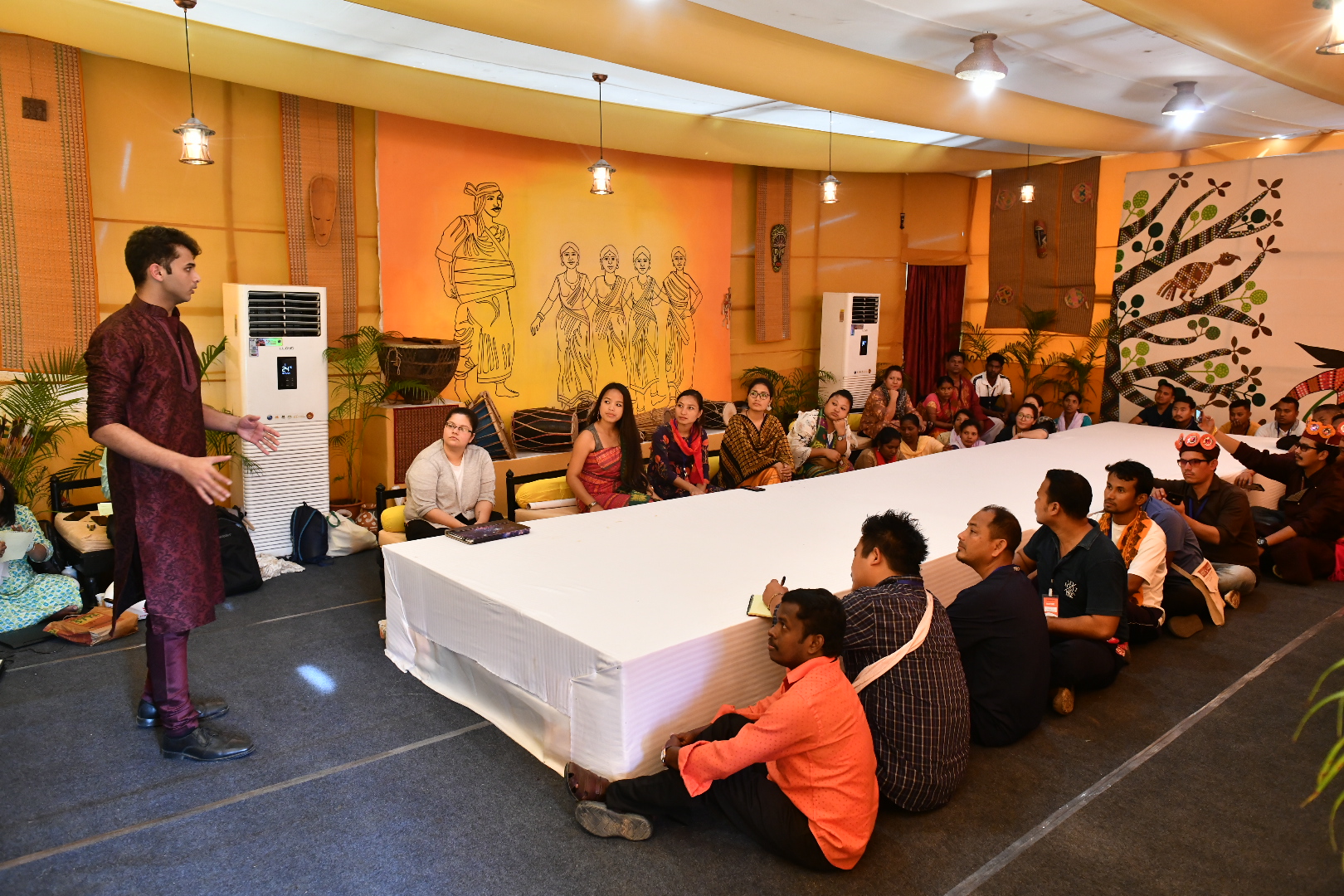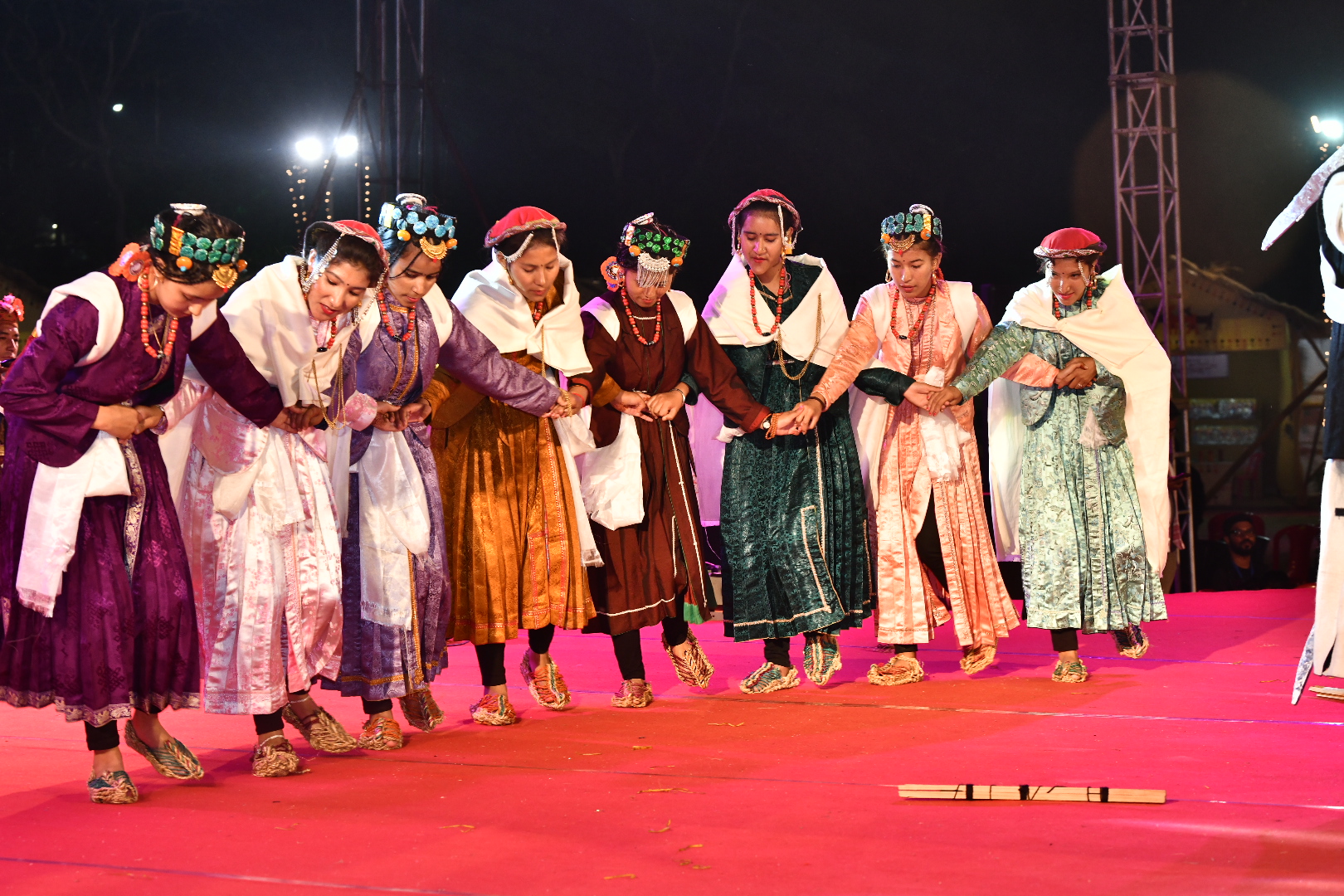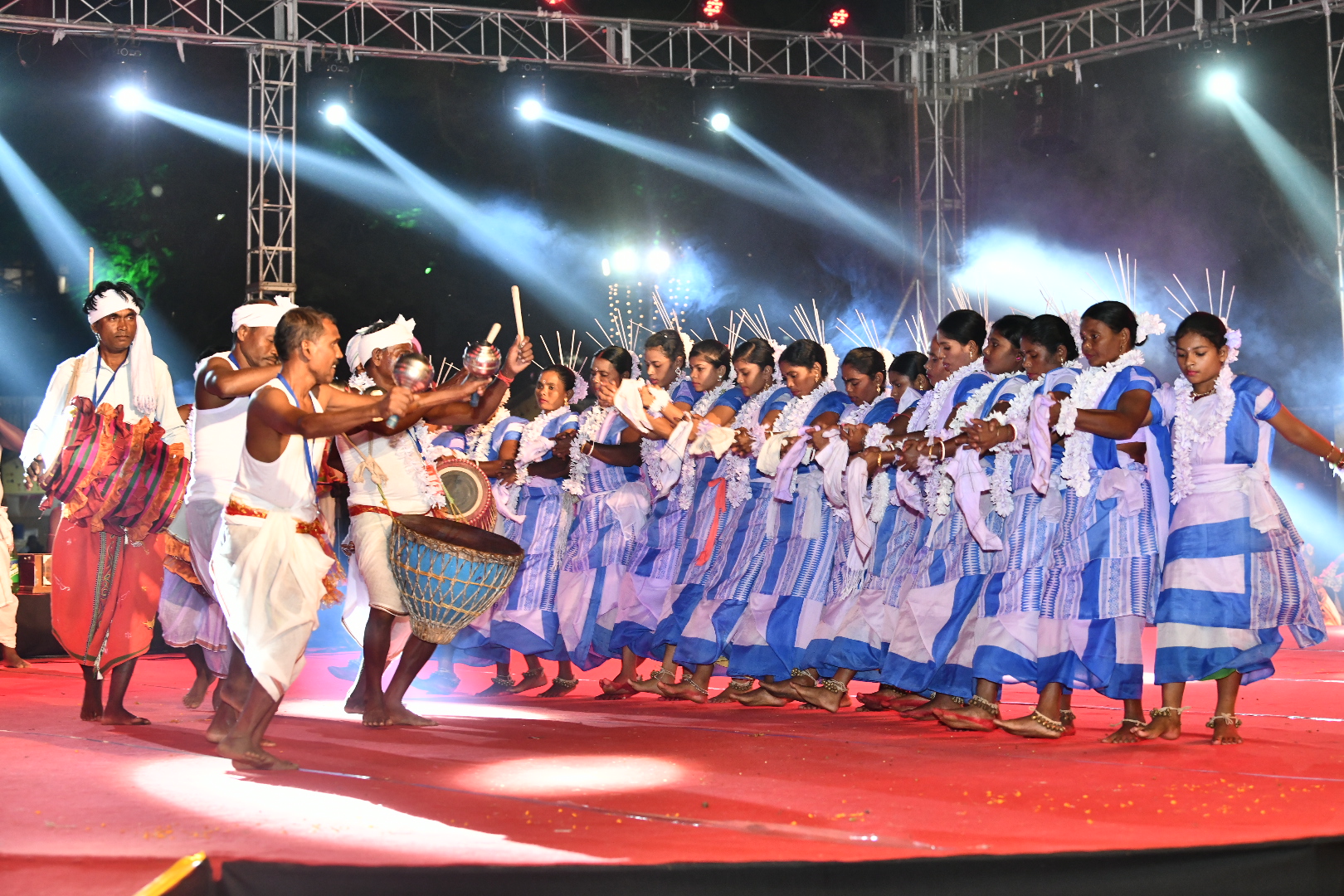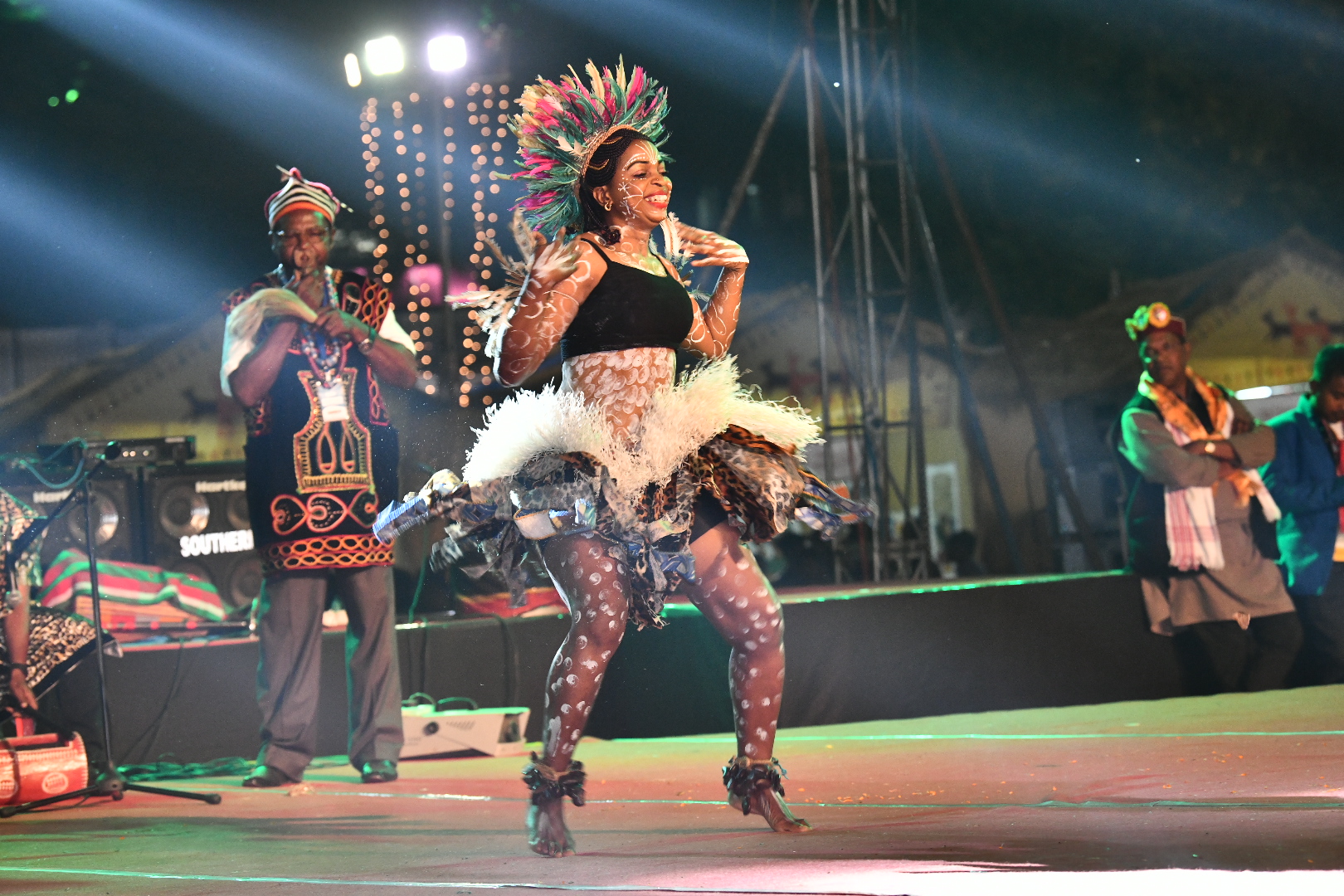Tribal communities enthrall the audience on Day – 4 of SAMVAAD
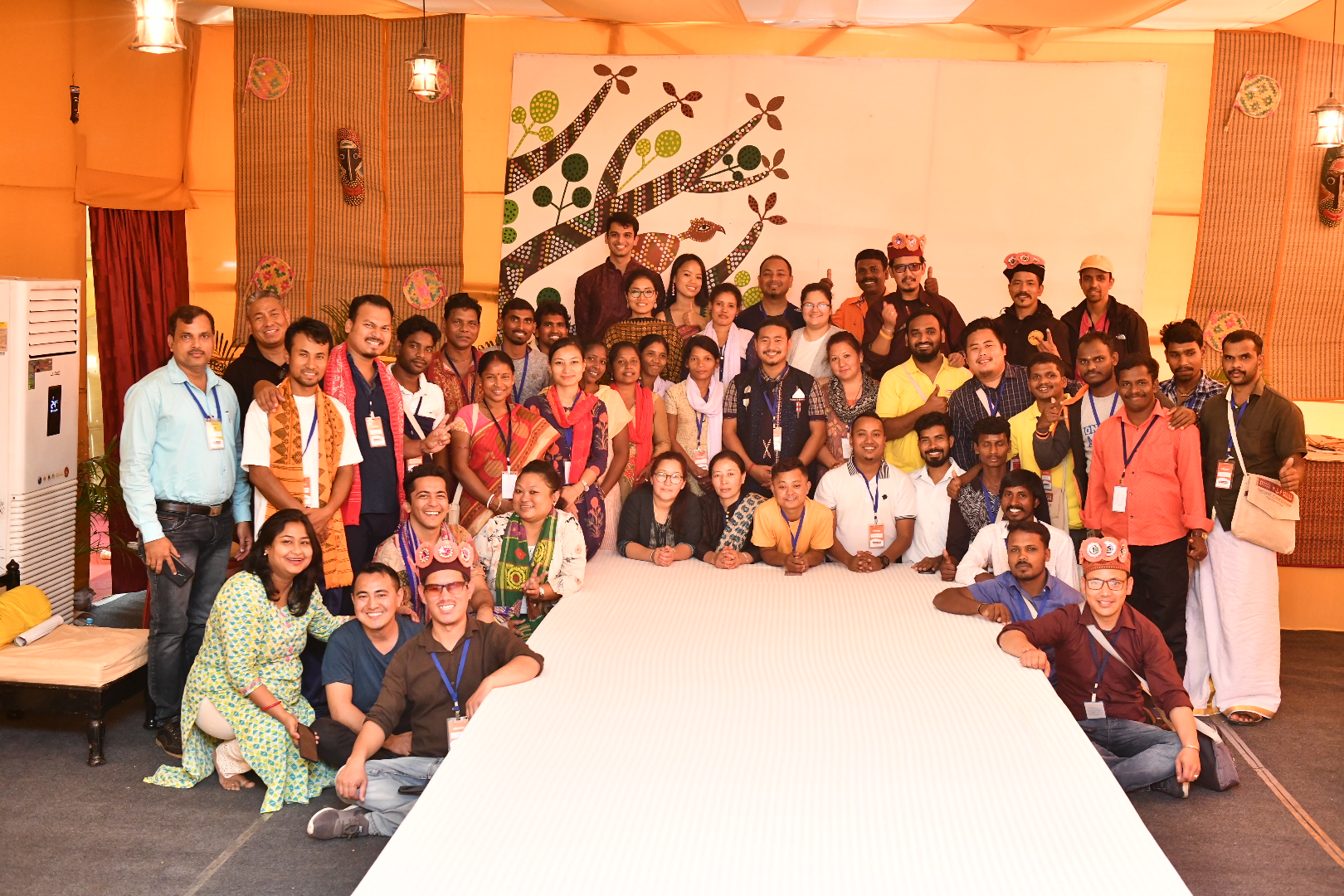
The Program at Gopal Maidan on Day – 4 of SAMVAAD began with performances from North India, and Himachal Pradesh. Spiti in Lahaul district of Himachal Pradesh is one of the most inaccessible places in the country, where due to inclement weather, the only means of entertainment there is dance and music. The group called Swangala Bodh Kala Manch presented the Sheini dance, which is performed by the Swangla Bodh community during the Yore festival in winters. In this dance, men and women dance in 2 concentric circles. Next came the Dhemsa which is not just restricted to special occasions and festivals but it is a part of the daily routine of the Pardhan tribal people. Since it is a group dance, it also helps the people in the tribal community to come together and promote a feeling of brotherhood and harmony. Next, the Mundari dance was performed by the members of the Mundari community which is typically done on different festive occasions, most of which are related to agriculture.
The Mavilan tribe from Kerala presented the Mangalakali dance. This dance is an integral part of their culture and is performed by the community almost on all auspicious occasions including festivals, harvesting and marriages. The dance is performed by the men and women of the tribe dressed in their traditional costumes. The instrument played in the dance was the thudi. From the State of Meghalaya, Khasi and Jaintia tribes performed the Rongkusi dance. It is performed during the harvesting period in winters and depicts the indigenous war community inhabiting Jaintia hills. The Bhil tribe from Gujarat perfored the Gosai dance. This dance is performed in the villages for 5 days at the time of the festival of Holi. The performance had as it’s s accompaniment the Nagara, Drapery, flute and brass plate.
Moving forward to the State of Jharkhand, Tom Murmu is a song-writer, music composer and producer from Dumka (Jharkhand). He is best known for taking the Santhali music, and presenting it around the world with a contemporary, global and modern flavor. Popularly known for his Adivasi Anthem, Tom Murmu and group regaled the audience with their rhythmic performance.
Earlier in the day, the schedule of activities at the Tribal Culture Centre was similar to the previous day though the deliberations were different. At the TCC the proceedings began with soul-searching and establishing the context for the day's theme. This was followed by shared learnings from incredible tales of collective struggle, as well as the sacrifices and successes, among tribal communities. The theme for SAMVAAD during the current year was the topic during a shared perspective on 'TRIBALISM TODAY’.
Program for Day - 5
- Community Visit and Culinary Workshop for 76 homecooks from 22 tribes at AATITHYA
- High-tea and Over-the-counter sale of curated tribal delicacies
- Concluding Samvaad 2019
About Tata Steel
Tata Steel group is among the top global steel companies with an annual crude steel capacity of 33 million tonnes per annum (MnTPA). It is one of the world's most geographically-diversified steel producers, with operations and commercial presence across the world. The group (excluding SEA operations) recorded a consolidated turnover of US $22.67 billion in the financial year ending March 31, 2019. In 2018, Tata Steel acquired Bhushan Steel Ltd (now renamed as Tata Steel BSL Ltd).
A Great Place to Work-Certified organisation, Tata Steel Ltd., together with its subsidiaries, associates and joint ventures, is spread across five continents with an employee base of over 65,000.
Tata Steel retained the ‘Global Steel Industry Leader’ position in the DJSI 2018. The Company has been recognised as the Climate Disclosure Leader in ‘Steel category’ by CDP (2017). Besides being a member of the World Steel Climate Action Programme, Tata Steel has won several awards including the Prime Minister’s Trophy for the best performing integrated steel plant for 2016-17, ‘GreenPro’ certification for products (Tata Pravesh Steel Doors, Tata Structura, Tata Pipes) by CII, Authorized Economic Operator (AEO) status (Tier 2) by the Directorate of International Customs (Ministry of Finance, Govt. of India), ‘Corporate Strategy Award’ by Mint (2018), Golden Peacock Award for Risk Management (2018) and Best Risk Management Framework & Systems Award (2019) by CNBC TV18. The Company also received the ‘Most Ethical Company’ award from Ethisphere Institute for the eight time (2019), Steel Sustainability Champion (2018) by the World Steel Association, Dun & Bradstreet Corporate Awards (2019), Golden Peacock HR Excellence Award by Institute of Directors (2018), ‘Best Companies To Work For’ recognition by Business Today, 'Asia's Best Integrated Report' award by the Asia Sustainability Reporting Awards (2017), among several others.
In 2018, the Company launched a corporate brand campaign #WeAlsoMakeTomorrow (www.wealsomaketomorrow.com)).
To know more, visit www.tatasteel.com | Follow us on ![]()
![]()
![]()
![]()
![]()
Disclaimer:
Statements in this press release describing the Company’s performance may be “forward looking statements” within the meaning of applicable securities laws and regulations. Actual results may differ materially from those directly or indirectly expressed, inferred or implied. Important factors that could make a difference to the Company’s operations include, among others, economic conditions affecting demand/ supply and price conditions in the domestic and overseas markets in which the Company operates, changes in or due to the environment, Government regulations, laws, statutes, judicial pronouncements and/ or other incidental factors.










